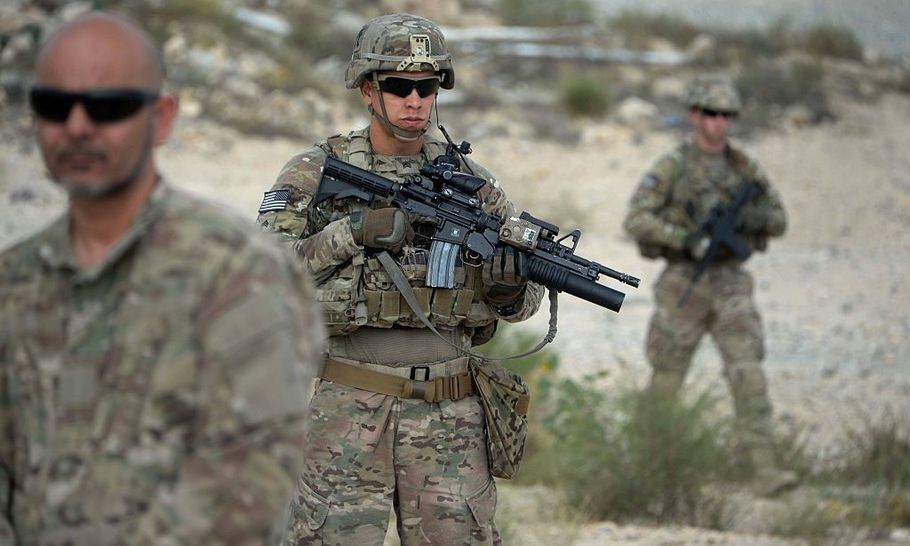The 9/11 Wars have highlighted America's limitations

Noorullah Shirzada/AFP/Getty Images
TheArticle recently ran a piece on America’s impending unilateral withdrawal from Afghanistan, characterising it as a betrayal. Seen through the eyes of Ashraf Ghani’s government in Kabul, that’s probably how it looks; seen through the eyes of the authors of US strategy in Washington, it might more closely resemble the principled realism that lies at the heart of policy in the America First era. Either way, it marks the likely end of a painful interlude in the strategic history of both countries – and yet it could have been so different.
The US and its allies, the United Kingdom prominent amongst them, responded almost immediately to 9/11 by taking the fight to al Qaeda and its Taliban sponsors in Afghanistan, and by the Spring of 2002, neither existed as a coherent entity. Moreover, having been bluntly asked if it was “with or against America”, Pakistan was proving an unusually amenable partner. The use of the word victory is to be cautioned against in Afghanistan, but as one of those who travelled freely in the country during this period I recall a palpable sense of a better future.
All the US led coalition had to do was turn military momentum into a sustainable political outcome, install durable institutions underwritten by the authority of the international community and depart with its political and military reputation burnished by another successful liberal intervention to follow in the sequence of Sierra Leone, The Balkans, East Timor and Kosovo.
Instead, the siren call of Iraq meant that the West became strategically distracted and ended up in the worst of all possible worlds which was to stay in Afghanistan but without the appetite or resource to make a real difference and the moment passed and eventually soured. War in Iraq has caused many casualties but the first and perhaps the most consequential was Afghanistan.
Counter factual analysis is the parlour game of the amateur historian, but let’s pause for a moment and consider what might have happened if America had shown fixity of strategic purpose in Afghanistan and avoided the Iraq imbroglio. First, the West would not have suffered the collective loss of confidence that has followed failure in Iraq, with untold consequences for Syria and the wider Middle East. Secondly, neither the disenfranchised Sunni Muslim phenomenon of ISIS nor the emboldened Shia Muslim phenomenon of an interventionist Iran would exist in the same form. And thirdly, had America maintained a global strategic outlook rather than focusing on a single region, more gradualist policies to limit China and Russia may have been employed. In an historical context, it might rank with Sarajevo and Munich.
So much for the obituary of the Wars of 9/11, but what does this tell us about the deeper rhythms of American strategy? Perhaps the first thing to understand is that the US military takes its cue from wider American society and is at its best when deployed in mass and supported by the almost infinite capacities for innovation, investment and manufacture that defines the nation. This is clearly evidenced by the Union victory in the Civil War, a cameo appearance in 1917/18, the prosecution of simultaneous Pacific and European theatres in the Second World War and a Cold War won by economic rather than military muscle. Deviations away from the model – like Vietnam – have tended to be less successful.
Seen in these terms, the Wars of 9/11 represent another deviation, and a complex one at that. The US military can claim to have fought three different campaigns in the decade after 9/11. The first was a light touch conventional engagement in Afghanistan that scattered the Taliban back to its villages or to safe havens in Pakistan; this was followed by the counter insurgency campaign in Iraq that peaked with George Bush’s Surge in 2007; in turn, this was followed by the counter terrorist campaign of drones and Special Forces raids that accounted for Osama bin Laden and still holds the field today. Each campaign was the material form of the military strategies from which they were derived, and each is a testimony to the US military’s ability to adapt and reform on the job, itself a reflection of the defining American genius for reinvention. But the excellence of the military instrument is only one element of national strategy, and, unless supported by competent statecraft, is insufficient in itself. History’s verdict is likely to be that interventions designed to illustrate America’s strength and reach served only to illustrate its limitations.
It was therefore a chastened US national security establishment that undertook the redefinition of strategy of which the withdrawal from Afghanistan is part. Published in December 2017 and containing the blueprint for global strategic engagement, the National Security Strategy (NSS) of the USA contains some elements which derive entirely from the current presidency. The neo-isolationist emphasis on America First, a lightly concealed contempt for alliances and a world view defined by ceaseless and predatory competition reveal Donald Trump’s fingerprints. But this is surface froth and a deeper look reveals the hard-headed, clear-eyed legacy of strategic professionals like Jim Mattis and John Kelly who guided the process.
The NSS has at its core a call for a back to basics national strategy. It recognises that wars between states are what defines history and that wars against non-state actors – like ISIS or the Taliban – are ephemeral; it sees Russia and China as clearly defined peer competitors and China, in particular, as posing a threat across the entire inventory of strategic power; it sees theatre nuclear modernisation and not counter insurgency doctrine as a key to future strategies. Above all, it regards the Wars of 9/11 as a strategic aberration and signals a return to the doctrines of mass, leading edge technology and global reach that have served America so well. Against that background, Afghanistan looks like yesterday’s war.





